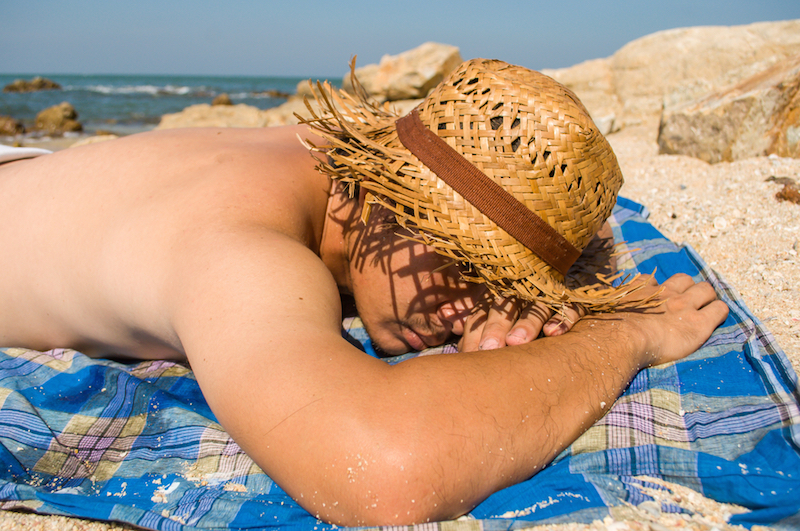
Why Does Being in the Heat Make Us Feel Tired?

If you're out and about on a sweltering day, it probably won't be long before you start to feel tired and sluggish. But why does being out in the heat bring on feelings of drowsiness?
The reason for this lethargy is simple: Your body is working hard to keep you cool, and this extra labor makes you feel tired, said Dr. Michele Casey, the regional medical director at Duke Health in North Carolina.
"Your body, especially in the sun, has to work hard to maintain a consistent, normal, internal temperature," Casey told Live Science. [What Would Happen If You Fell Into a Volcano?]
On a hot day, your body makes several adjustments to maintain its temperature. For instance, it dilates your blood vessels, a process known as vasodilation, which allows more blood to flow near the skin's surface. This allows warm blood to cool off, releasing heat as it travels near the skin, Casey said.
This increased blood flow near the skin explains why some people look redder when they're feeling hot, according to the BBC.
In addition to vasodilation, the body secretes sweat onto the skin. This sweat then cools the skin as it evaporates, Casey said. But in order to do this extra work, your heart rate increases, as does your metabolic rate (the number of calories your body needs to function), she said.
"All that work — increasing your heart rate, your metabolic rate — eventually makes you feel tired or sleepy," Casey said.
Sign up for the Live Science daily newsletter now
Get the world’s most fascinating discoveries delivered straight to your inbox.
Furthermore, most people spend their lives slightly dehydrated. Being hot and sweaty only worsens that dehydration, and a symptom of dehydration is fatigue, she noted.
Getting skin damage from the sun can also heighten dehydration. When the sun's rays beam down on your skin, it can cause pigmentation changes, wrinkles and burns. "These chemical changes actually cause fatigue," Casey said. "That's because your body is working to repair the damage."
Sunburns impair your body's ability to regulate its temperature, she said. What's more, when you sunburn, your body diverts fluid from the rest of the body toward the burn in an attempt to heal the skin. This diversion means you have less fluid overall for sweating, which can lead to more dehydration and fatigue, Casey said.
What to do
Often, people who are feeling hot might try to cool down with a cool drink, such as alcohol. But alcohol is a diuretic, meaning it may only increase dehydration, Casey said. Coffee, on the other hand, is actually not a diuretic, according to recent studies. But the best way to fight dehydration is with water and a salty snack, such as pretzels or baked potato chips, Casey said.
She advised people to be aware of the symptoms of heat exhaustion: sweating heavily, having a rapid pulse and feeling faint or sleepy. "If that happens, we recommend you get somewhere cool, drink water and see a physician if the symptoms don't improve within about an hour," Casey said.
Heat stroke is a more serious condition, in which the body's core is 104 degrees Fahrenheit (40 degrees Celsius) or hotter. This condition requires emergency treatment, as it can lead to damage to the brain, heart, kidneys and muscle. Symptoms include high body temperature, nausea, vomiting, headache and changes in behavior, such as confusion, agitation or irritability. Other symptoms are slurred speech, seizures or coma.
To cool down, Casey advised going to a cooler environment, such as the shade or an air-conditioned area, especially during the hottest hours between 10 a.m. and 2 p.m. local time. It's also important to stay hydrated, she said.
Editor's Note: This article was updated to fix the Fahrenheit to Celsius conversion.
Original article on Live Science.

Laura is the archaeology and Life's Little Mysteries editor at Live Science. She also reports on general science, including paleontology. Her work has appeared in The New York Times, Scholastic, Popular Science and Spectrum, a site on autism research. She has won multiple awards from the Society of Professional Journalists and the Washington Newspaper Publishers Association for her reporting at a weekly newspaper near Seattle. Laura holds a bachelor's degree in English literature and psychology from Washington University in St. Louis and a master's degree in science writing from NYU.









